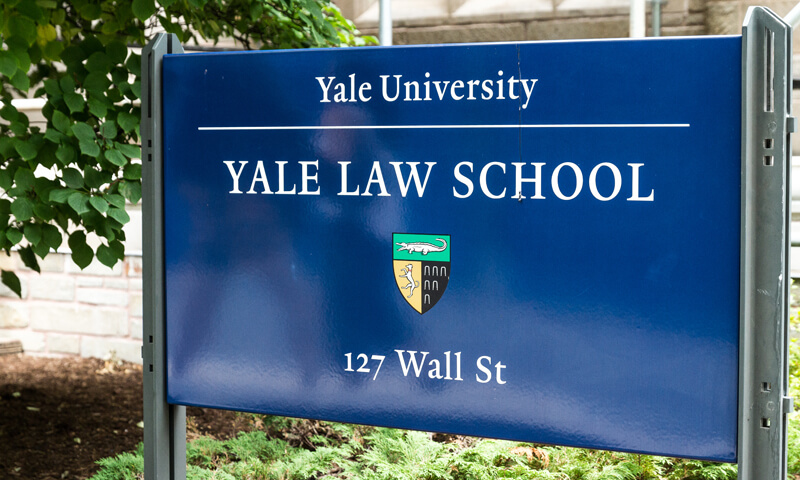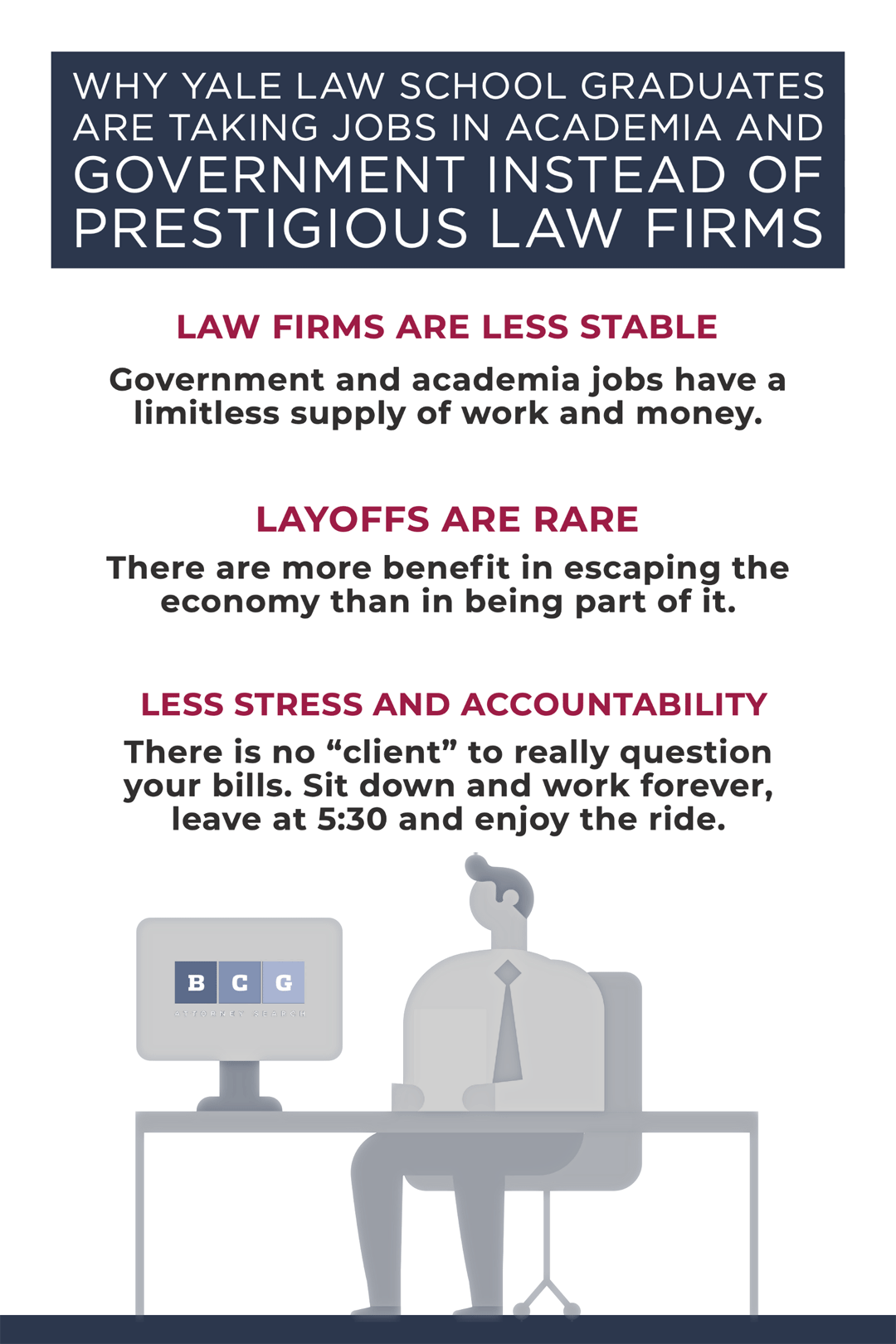, and, with some exceptions, the resumes are all quite strange to me. Many of these attorneys start in large law firms and then seem to go adrift after a few years of practice. They take
, in academia, with policy think tanks, and so forth—and then bounce around from one of these types of
. Many of these attorneys never go to work inside law firms and then contact me years after graduating from law school, flirting with the idea of trying it out.
but they do not pay particularly well, are not very demanding in terms of the work they require, and the
that these jobs offer to society is often negligible compared to working inside of a law firm. Since the attorneys are not accountable to “real clients,” they do not have the pressure of billable hours. The “clients” are governments, policy think tanks, rich law schools, and others with money to spend without requiring much accountability.
that allow them to charge “rent” to employers who, within reason, will not require anywhere near the level of accountability and hard work that a law firm would require.
These Yale attorneys get so far off the law firm path they are unlikely ever to be able to go back (and many do not want to).
I have pondered this for the longest time and, quite honestly, when I compare the resumes of the people I see from Yale Law School to those of graduates of Harvard, Stanford, and other
, I have always thought the people from Yale Law School look “lost” and as if they do not know what they are doing. I have seriously contemplated that there must be something seriously wrong with the school because the resumes, one after another, give the appearance of “aimlessness.” When these attorneys call me looking for work inside of law firms after this type of career path—which generally has conferred limited meaningful experience from a law firm perspective—they often “expect” to join law firms as partners.
I spoke to one of these attorneys the other day. He was a
law professor at a local law school in Los Angeles.
“I would like to join a law firm like
Gibson Dunn or
O’Melveny as a partner—but I would like to try and keep my schedule to 40 hours a week if possible. What kind of vacation benefits do they offer?”
I thought I must be in an alternate universe. The attorney clearly was smart. Could it be that I was so out of touch with reality that someone who had spent the past seven years teaching three classes in a law school and writing a bunch of scholarly articles with titles that used words I had not even heard of was qualified to work in a major law firm?
I have these sorts of conversations quite often, which never made sense to me. Very few graduates of schools like
Columbia,
Michigan,
Duke, and so forth would have the audacity to be so careless with their law firm careers and expect ever to be able to come back. They seek to understand the rules of the law firm environment, and they play by those rules.
After a career of looking at these bizarre resumes of Yale Law School graduates, I came to the following conclusions:
- they had no idea what they were doing,
- they needed to have their “value systems” realigned (by me),
- they needed this help to be more effective attorneys and get “real jobs.”
I used to give speeches at law schools where I told future attorneys they were not as great as they thought. Over the past year, I have contemplated contacting Yale Law School and telling them I wanted to give a talk there because they are producing some of the most aimless, messed up, law-firm-caliber attorneys possible. A few times, I came close to picking up the phone but decided to give the matter more thought: Could it be the attorneys who come out of Yale Law School are actually some of the smartest, most well-balanced, and career-savvy attorneys imaginable? Surely, Yale Law School has produced some highly successful national figures, and many Yale
Law graduates have done unbelievably well.
Maybe I had it all wrong. Maybe the traditional logic of graduates of “lesser schools” (anything other than Yale Law School) was all flawed—and the people at Yale knew something “followers” like me who propagate a particular way of thinking about the law firm world did not know.
The most important thing a law school can do for you is not just to teach you the law but to teach you rules for thinking about your career. Maybe all these great minds at Yale Law School were thinking about career issues in a “better way” that I did not yet understand.
I now understand what is going on. If you understand what these attorneys are being taught or somehow pick up at Yale about their careers, you may end up much happier and have a much better career. Now that I understand what they are doing (and maybe they do not even understand what they are doing), I am extremely impressed. What they do is available to you and will profoundly change your career.
When I was in law school (a long time ago), a friend said, "This is great. All you need to do is take classes here for three years, and then you can make $80,000 a year.” Today, that number would be much higher; however, what this future attorney was saying could be summed up like this:
If you get a law degree, you can “rent” yourself out for $80,000 a year to someone.
The traditional way of thinking about a career, which is how most attorneys think, is that you want to rent yourself out for as much money as possible. In the quest to
charge “high rent,” attorneys make some of the most amazing career decisions.
- They go to New York City and join the large law firms that pay the most—despite not factoring in the high taxes, lack of advancement opportunities, quality of life, grueling hours, and other factors.
- They feel bad when they do not get the highest-paying jobs and continually seek out these jobs.
Most lawyers are all about charging rent! Most lawyers shape their careers in ways that allow them to charge as much rent as possible. Everything is about rent. It is about rent when an attorney is looking for his or her first job, next job, or the job after that.
- Attorneys rent themselves out to clients for a certain amount per hour.
- Attorneys rent themselves out to law firms for a certain amount per year.
- When that work dries up, attorneys rent themselves out to companies, the government, and others for a certain amount per year.
If you are renting yourself out, it seems logical that you should understand the rules of how to charge rent and make money doing so. Let’s face it: You are a rent seeker and will succeed based on your ability to get people to pay you rent. You need to understand the rules of rent and what it means.
I worked in the Justice Department in Washington, DC, during my first summer of law school. I worked in an interesting division that had a bunch of Yale Law School graduates in it. They were all pretty smart guys and seemed to have pretty nice lives. They were rarely—if ever—in the office after 5:30 pm. They belonged to softball leagues and seemed to have much free time. However, I had no idea why they worked for half of what attorneys made in private practice. I thought they all must be out of their minds. However, they seemed incredibly happy in their jobs and spoke about how much they always liked their jobs.
“
Why would someone work for half of what they could make in a large law firm?” I wondered all summer. I eyed them almost suspiciously as if they were insane. I sat at lunch with them wondering what was wrong with them:
Why work two years for the price of one?
The next year I was a
summer associate at a large New York law firm. I got a federal clerkship for the year after I graduated, and the firm found out about it. My school told me a clerkship would help me in my career—so I pursued it enthusiastically. When I got to the law firm, many associates were puzzled that I would do a clerkship: “You’ll be making less than half of what you would be here,” they told me.
The problem with most rent-seeking attorneys—especially the ones who cast their lots by charging law firms money for their services—is that they can only charge rent for so long. This is what my former law school friend learned the hard way. He called me up very upset. He had been working in the law firm world (and charging “rent” there) for about 12 years and had become a non-equity partner in a major law firm. He had three children, a house, and a wife. He thought he was doing well, but the law firm told him they no longer had a job. He was panicking because he had no business and no prospects. He sold his house and became a solo practitioner. You cannot rent yourself out to high-paying employers forever. It generally never lasts very long unless you provide far more benefit than giving.
I cannot tell you how many divorces and other tragedies I have seen when a rent-seeking attorney finds out the cold hard reality that rent will not be paid, at the same level, to that attorney forever. No matter how “technically proficient” you may be, employers do not need to pay high rent to you unless you give them a corresponding benefit far exceeding the rent they charge.
Some rules are extremely difficult to get around when you are part of a market economy (and law firms are). A law firm runs on economic rules, and these rules are (generally) efficient. This means they are always looking for the maximum value for the rent they seek.
- If they can get someone younger and hungrier, they will.
- If they can pay someone less, they will.
- If they do not have to make you a partner, they won’t.
- If they can pay you less money, they will.
- If they can pay you less of the revenue for the clients you bring in, they will.
The
economics of how law firms operate and the value they extract from rent-seeking attorneys is a constant force in the law firm world. These economics are brutal, and the consequences can be dire for those subject to them. There are layoffs, job losses, alcoholism, divorces, prescription drugs, weight gain, weight loss, stress-induced cancer, heart attacks, and more. The reality of working in a law firm surrounded by harsh economic realities is not easy. I know one attorney in his late 30s who killed himself. I know several who were dead by their early 40s. It is brutal when you are part of an economic system where value is extracted from you to the maximum possible extent.
There are a whole host of reasons why it is extremely difficult to get a job in a large law firm paying a lot of money. I am not going to get too far into these reasons here; however, the main reason is the power imbalance:
Law firms have something that most attorneys do not. Large companies and clients are willing to “rent” their services for much more than they pay their attorneys to do the work. They have reputations, brands, management systems, resources, offices, institutional knowledge, and other things that allow them to charge a lot of money. Because they have access to this work and a flow of money coming in, they have much more power from an economic standpoint than most attorneys. Law firms have power, while individual attorneys do not. Because this balance of power is so extreme, they will get crushed unless attorneys understand how to “exploit” and make this system work for them.
Law firms operate on the premise that some people will figure out the “hidden” rules and make the system work for them, and others will not. Law firms generally do not care if you understand and figure out the rules because they have so much power and money they succeed either way. Very few attorneys ever understand the system, and because of this, most attorneys do not succeed in law firms.
The idea of charging “rent” for your services is something that most attorneys never escape. They believe that once they go to law school and get a job paying a certain amount of money at a law firm, they will be entitled to charge “rent” for their services for as long as possible. Their careers become searches for that rent or higher rent, and they operate under the mistaken belief that they will always be able to rent themselves out for a certain amount of money. The emphasis is always on the “amount of rent” the attorney receives for his or her services. Law firms stay in power because they can pay high rent.
Attorneys continually pursue these jobs and want them because of the high rent that is paid. The stress, power imbalance, and challenging conditions continue and never end.
The smartest attorneys figure out how to continually have access to rent without stress. Your career is basically about how you charge rent and receive rent for your services while staying alive and being happy. In this respect, when you think about what a disproportionate number of graduates of Yale Law School are doing, it begins to make a lot of sense.
They understand the rent rules and how to make them work for them.
When Yale Law School attorneys (and sometimes attorneys from other law schools) go into things like “public service,” academia, nonprofits, government, and all of the jobs of the law firm grid, what they are doing is about as brilliant as it can get. They are finding groups with a ton of money that will pay them the most amount of rent for the least amount of accountability to the economy. They are escaping the market economy and going into a place where these rules do not apply.
- When you take a job with the government, you work for a largely inefficient employer with a near-limitless supply of work and money. There is less oversight. If you are inefficient with your time, there is no “client” to question your bills. Sit down and work forever, leave at 5:30 and enjoy the ride. You can also enjoy your health and life a great deal more. Layoff? Quite rare—you are not part of the normal economy.
- When you take a job in a law school, you are also working for a largely inefficient employer supported by tuition and giant endowments. You need to write and show up to teach classes; however, the pressures are different, and the money keeps coming—especially at well-regarded law schools. You can even get “tenure,” which will entitle you to a job for life (something unheard of in the law firm world). Layoffs? Quite rare—you are not part of the normal economy.
The rules are the same for nonprofits, think tanks, and so forth. You can talk about “improving the world” or whatever you want; however, what I see again and again is rent-seeking behavior in terms of these graduates.
They find a way to charge the most amount of rent, for the most respected job, with the least stress and accountability possible. For example, Bill Clinton (a Yale Law School graduate) taught law school and then went into government. So did Barack Obama (
Harvard Law School). These two men are the ultimate rent seekers; they managed to avoid the rules of the market economy yet still found institutions to pay them to rent without being economically accountable. This is absolutely brilliant, and it certainly worked for each of them. They figured out the system.
In contrast, can you imagine what would have happened to Barack Obama had he taken a position at
Sidley & Austin, where he was a
summer associate? He would have received more “rent” out of law school, but he would have had to work his tail off. He might never have become involved in politics because he would not have had the time. He might have gotten laid off. Maybe he would have become “of counsel” and be worried about keeping his job. Or look at Bill Clinton. Maybe he would have gone to work in a large
New York City firm. But what would have happened to him, and where would he be today?
Attorneys who expose themselves to the market economy generally go in a far different direction than those who do not. What people pick up at Yale Law School is that there are real advantages to being strategic about how you “rent yourself out.” You need to be careful about how you rent yourself. The most profound understanding of the economy and your value comes when you can largely avoid the rules of the market economy and rent yourself out to someone with a deep pocket but with little accountability.
What Yale Law School graduates pick up and what could change your life and career is that you need to receive rent from the deepest pockets possible, with the least amount of accountability possible, outside the rules of the “normal” market economy. If you look at people who did this (like Bill Clinton, Barack Obama, and others), they became incredibly successful. Who would not choose this path if they could?
The more you expose yourself and pursue a career in the traditional market economy, the more difficult it will be for you to stay employed, stay sane, and have an everyday life. The market economy will push and pull you, set you in competition with others, chew you up, make you fight harder, and generally make life very demanding. It will keep you away from your family and may get you divorced. It will deliver you to your 60-hour week in a big Mercedes, but is that worth it?
Yale Law School graduates learn that there is often more benefit in escaping the economy than being part of it. That may be the best lesson you can learn. The time to ponder, think and strategize can even create a President—something that would be impossible for an associate at a major law firm. You would never have the time. You need to bill, bill, bill.
Image credit: at the
English language Wikipedia

















